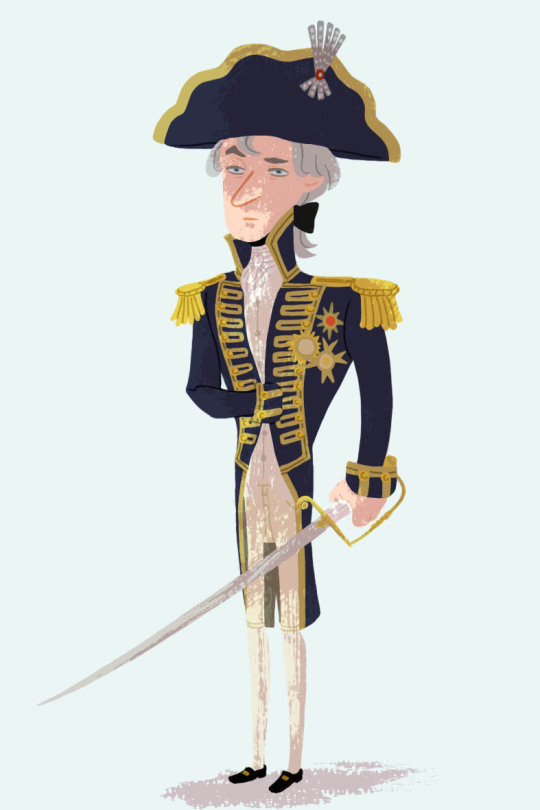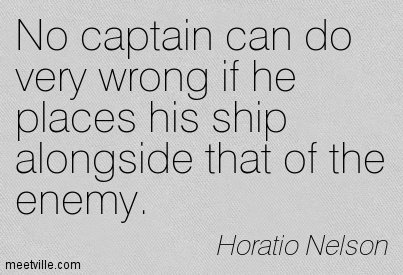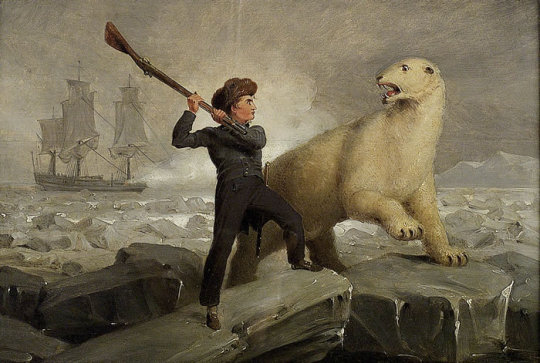#horation nelson
Text
whatever you think about 'kiss me, hardy' in the context of nelson's relationship with cpt thomas hardy, you do have to admit that there's nothing funnier than victorian scholars confidently asserting that nelson spoke turkish in his dying moment because it kind of sounds like the word 'kismet' meaning fucking destiny. sheathing occam's razor and reaching for the farthest most outlandish conclusion so hard they probably sprained their arm
9 notes
·
View notes
Text
The other day, I was reading Nelson's wikipedia page and I got to his death and then the following passage:
Nelson's body was placed in a cask of brandy mixed with camphor and myrrh, which was then lashed to the Victory's mainmast and placed under guard.[246] Victory was towed to Gibraltar after the battle, and on arrival the body was transferred to a lead-lined coffin filled with spirits of wine.[246] Collingwood's dispatches about the battle were carried to England aboard HMS Pickle,
But my dumbass brain just read: Nelson's body was placed in a cask of brandy ... carried to England aboard HMS Pickle,
And I got really excited for a second... And then really disappointed :'(
DAMMIT HISTORY! WHY COULDN'T YOU HAVE GONE FOR THE FUNNY OPTION! (his body boringly remained aboard the Victory in its delicious boozey prison)
#meaning no disrespect of course#okay maybe a little disresepct#he was mean to his wife okay#much like another Horation we know...#and Nelson was also big on slavery#which I guess isn't surprising for someone in the Royal Navy#where NO isn't considered an answer when some guy in a blue coat asks if you'd like to join up#wow did I spell Horatio with an n up there?#No going back now I cba#ANYWAY#Point is HMS PICKLE IS THE PERFECT NAME FOR A SHIP CARRYING SOME GUY'S PICKLED REMAINS AND THIS MISUNDERSTANDING CONTINUES TO HAUNT ME#DAYS LATER#WE COULD'VE HAD IT AAAAAAAAA-AA-AAALL#Anyway whatever... I am going to read about queen HMS Pickle#She sounds like FUN
7 notes
·
View notes
Text
History - Captain Horatio Hornblower
After the victory of a British fleet (commanded by Lord Horatio Nelson) over a French-Spanish fleet (commanded by Pierre de Villeneuve) at Trafalgar, Britain „ruled the waves“ for over a century - and London was the centre of that power. The 12 Hornblower novels from C.S. Forester and the movie „Captain Horatio Hornblower“ describes the seafaring life aboard a warship at those times. For sure one of the triggers to visit London one time to deep dive in those historical times.
youtube
Naval Battle Scene 1
youtube
Naval Battle Scene 2
Sea battle scenes from the movie „Captain Horatio Hornblower“. The movie scenes show vividly what contributed as well to Nelson's success at Trafalgar: Nelson was able to outmaneuver the superior enemy fleet since the British ship crews were more capable (they were more skilled in the rigging and were able to fire more rounds with their cannons). Nelson's feat was to find a tactic that would best utilize his people's abilities.
-Simplicius Simplicissimus
#traveling#reisen#england#london#movies#filme#captain horation hornblower#des königs admiral#horatio hornblower#horatio nelson#gregory peck#simplicius simplicissimus#history#geschichte#books#bücher#Youtube
0 notes
Text
FREE E-BOOK FRIDAY
.
😯 Each Friday I will make you aware of Free Hourly History e-books for use on the kindle app. (A day late 🙂)
.
👑 This Friday my main choice is king George VI
.
King George VI ruled long enough to oversee the tumultuous post-war years in Britain, the collapse of the British Empire & the emergence of the Commonwealth. Succeeded by his daughter Elizabeth at just 55 years old, King George VI had a deep sense of honour & duty & was completely dedicated to his turbulent role as King.
.
🇬🇧 The featured books are available in my UK store, in the £1 or less kindle book section. 🇬🇧
.
🇺🇸 And also our U.S store in the $3 or less section 🇺🇸
.
For non UK/U.S The books may be free in your region so worth checking out.
.
Visit our;
UK store 🇬🇧
US store 🇺🇸.









.
☑️ The books are only free until 10 May.
#FREE#Ebooks#History#Historybooks#Hourly history#Royal family#George VI#King George VI#Charles I#KING OF England#King Charles#King charles I#Horation Nelson#charles dickens
2 notes
·
View notes
Note
i’ve looked everywhere and can’t seem to find the info, but say someone has two titles in regency era england which would you use first? like if someone is the eldest son of a baron but also a captain in the military what titles would be used to address him? thank you!!
Well, Horation Nelson’s full title seems to have been Vice-Admiral Horatio Nelson, 1st Viscount Nelson, 1st Duke of Bronte. So I’m going to assume you’d call your imaginary baronet captain “Captain Sharpe,” or whatever his surname was.
15 notes
·
View notes
Text
Seeschlacht bei Abukir
Die Seeschlacht bei Abukir (englisch Battle of the Nile) war eine der entscheidenden Schlachten während der Koalitionskriege. Sie fand am 1. und 2. August 1798 vor der Küste von Abukir, einer ägyptischen Hafenstadt etwa 15 Kilometer nordöstlich von Alexandria, statt. Großbritannien war 1798 das einzige einflussreiche europäische Land, das sich noch im Krieg mit der französischen Republik befand. Die französische Flotte war in einer Linie von der Insel Abukir aus zur Küste verankert. Diese Aufstellung verwandelte die Flotte in eine langgestreckte, schwimmende Küstenbatterie. Als die französische L’Heureux am frühen Nachmittag des 1.August 1798 die britische Zealous sichtete, war der französische Admiral Brueys D’Aigalliers nicht weiter beunruhigt – es erschien unwahrscheinlich, dass die britische Flotte noch an diesem Tag angreifen würde. Das britische Geschwader unter Admiral Horation Nelson hatte indessen den stehenden Befehl, einem vor Anker liegenden Gegner keinerlei Zeit zur Vorbereitung zu geben. Trotz der Tageszeit wurde um 15 Uhr das Signal „Klar zum Gefecht“ gehisst. Die Schlacht begann kurz nach 18 Uhr. Am Ende besiegte eine britische Kriegsflotte die französische Mittelmeerflotte. Mit diesem Sieg sicherten die Briten ihre Seeherrschaft im Mittelmeer. – Zum Artikel …
0 notes
Photo

one more time!!!
#Lord Nelson#horation nelson#nelson#lord horatio nelson#Viscount Nelson#marine#georgian era#georgian navy#navy#my art#British history#history#Horrible Histories
20 notes
·
View notes
Photo

True that. Straight at 'em! -B
20 notes
·
View notes
Quote
You cannot think how my feelings are alive toward you, probably more than ever & they never can be diminished.
lord horatio nelson
8 notes
·
View notes
Photo

Horatio Nelson vs. The Polar Bear
The great hero of Trafalgar, Admiral Horatio Nelson began his naval career at a very young age. At the age of 12 Nelson joined the navy and by age 15 he was a midshipman who was being trained to be an officer.
In 1773 Nelson was recruited to serve on the HMS Carcass, which was on an expedition to explore a route to India through the Arctic. The expedition explored deep into the Arctic, but was forced to turn back because of the dense ice sheets of the North Pole. While anchored near one ice sheet, young Nelson had an idea which would bring him his first moment of fame and glory.
Nelson's dream while serving in the Arctic was to hunt and kill a polar bear. While anchored north of the island of Svalbard, young Nelson set of onto the ice armed with a musket in hopes of shooting and killing a polar bear. Unfortunately when Nelson came across his dangerous prey, his musket misfired. The polar bear attacked and Nelson was forced to fend off the assault by bashing the bear over the head with the butt of his musket. Amazingly the bear retreated, and more amazingly Nelson pursued the bear, determined more than ever to slay the mighty beast. It was only until the bear was able to escape over a large crevice in the ice, and when Nelson was ordered to return back to ship, did the young sailor abandon pursuit. When asked why he wanted to kill a polar bear, Nelson responded, "I wished, Sir, to get the skin for my father."
Nelson would later become one of the most successful and celebrated British Naval Officers in history, rising to the rank of Captain by age 23, and becoming an admiral in his 30's. Throughout the late 18th and early 19th century, he was a painful thorn in the side of another young upstart, a landlubber French general named Napoleon Bonaparte. He was killed by an enemy marksman at the Battle of Trafalgar in 1805, aged 47.
735 notes
·
View notes